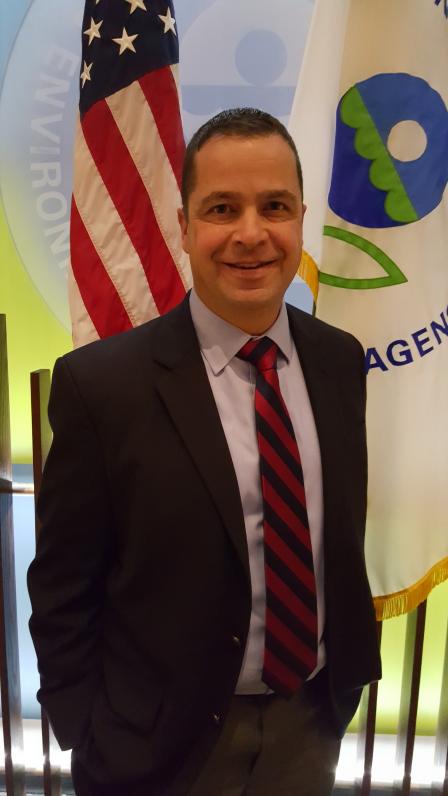Meet EPA Researcher Chris Impellitteri
 Meet EPA Researcher Chris Impellitteri Undiscovered rockstar and bug whisperer-in-training Chris Impellitteri has worked in a lab since he was 20 years old. As the Associate National Program Director for EPA’s Safe and Sustainable Water Resources program, he leads the Green Infrastructure and Water Systems initiatives which serve to improve and protect the nation’s water infrastructure through sustainable solutions.
Meet EPA Researcher Chris Impellitteri Undiscovered rockstar and bug whisperer-in-training Chris Impellitteri has worked in a lab since he was 20 years old. As the Associate National Program Director for EPA’s Safe and Sustainable Water Resources program, he leads the Green Infrastructure and Water Systems initiatives which serve to improve and protect the nation’s water infrastructure through sustainable solutions.
Tell us about your background.
My past research has focused mainly on the fate, transport, and bioavailability of contaminants in soils sediments, and water. Education-wise, I am an academic mutt: BS in biology, MS in geology, and a PhD in civil and environmental engineering. I am currently the Associate National Program Director for EPA’s Safe and Sustainable Water Resources program and lead the Water Treatment and Infrastructure Research Topic.
When did you first know you wanted to be a scientist?
I have been a lab rat since I was 20. I started as an analytical technician in the Pesticide Residue Analysis Lab at Virginia Tech. I worked on a split nitrogen application field project on farms around the Chesapeake Bay. The research provided results to wheat farmers indicating that bigger harvests resulted from timely applications of nitrogen and also reduced nitrogen runoff into the Bay. That was a win-win situation. While serving as a Peace Corps Volunteer in Burundi, East Africa, I saw and experienced the devastating effects of malaria and gained a better understanding of the environmental costs and benefits of pesticides for mosquito control. Clearly not a win-win situation. These three experiences put me on a path to test tubes, fecal coliforms, and hazardous chemicals.
How does your science matter?
Our science helps people to make decisions on how to evaluate and manage potentially dangerous and harmful contaminants. In some cases, research results help EPA program offices in decisions on rules and regulations. In other cases, our research contributes to dealing with environmental issues at specific sites.
What do you like most about your research?
Water-related research at EPA has expanded over the past decade through some amazing scientific advances, such as molecular techniques for evaluating microbial communities and mass spectrometry for emerging contaminants. I like and respect the passion, dedication, and professionalism of the EPA researchers involved with the water research across the US.
If you could have dinner with any scientist, past or present, who would it be? What would you ask him or her?
Alfred Wegener over sauerbraten and rotkraut. I would ask him why it took so long for us to figure out continental drift when it is obvious that all the pieces of the puzzle fit together.
If you weren’t a scientist, what would you be doing?
Leading a power trio in the art of rock and roll, of course.
If you could have one superpower, what would it be and why?
Bug whisperer. I could get them all out of the house without using pesticides.
Any advice for students considering a career in science?
Have patience and perseverance.
What do you think the coolest scientific discovery was and why?
Heliocentrism. It had all the dramatic elements of science, engineering, and politics. The controversies that existed in the early 1600s have continued throughout history to this day. I like the way Neil DeGrasse Tyson put it: “You get to say the world is flat because we live in a country that guarantees free speech, but it’s not a country that guarantees that anything you say is correct.”
What do you think is our biggest scientific challenge in the next 20/50/100 years?
Moving on from carbon-based fossil fuels.
Whose work in your scientific field are you most impressed by?
In green infrastructure, Lew Rossman’s (EPA-retired) work on stormwater management modeling. His models are used throughout the world. Lew really taught me the importance of civil service. Any and all of the researchers involved with advances in microbial (bacteria, viruses, protozoans, fungi) risk assessment. As I mentioned above, the methods we use today have revolutionized the way we evaluate and manage microbes in water.
You’re stranded on a desert island with a community of other survivors – what is your job?
Human waste management. According to friend and colleague Mike Elovitz, your willingness to do this job gets you out of just about everything else.
Editor's Note: The opinions expressed herein are those of the researcher alone. EPA does not endorse the opinions or positions expressed.
